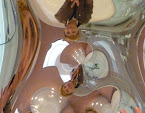Saturday, and I’ve spent today hanging Serengeti blinds on the back windows of the house. I think they must be ‘Serengeti-style’ blinds as they were purchased for a modest price at Spotlight in Penrith and don’t actually come from Serengeti, Tanzania. They’re more likely to have been ‘Made In China’. My hanging is possibly minutely crooked but passing strangers, blind people in a hurry and those with the naked eyes will probably not notice.
While I was going up and down the aluminium ladder I was thinking about the books I’ve been reading recently. I finished Joe Amato’s book Industrial Poetics : Demo Tracks for a Mobile Culture early last week. At first I found that I was resistant to the book. Its notes and bullet-style presentation seemed a bit scrappy to start with but then, as I kept reading, I began to follow Joe Amato's thinking on ‘how to tell the difference between life and art’ more receptively and I started to enjoy and empathise with segments recounting board meetings and job interviews from a poet’s viewpoint. I was always almost instantaneously sceptical of the first whiff of managerial language in my old job in a university library and in my previous careers. Joe Amato analyses the places ‘art’ is given by the ‘real world’ very convincingly and he firmly upholds a belief in whatever it is that makes poetry a ‘mysterious’ artform. This book crept up on me - my persistence was rewarded.

From the end of Industrial Poetics - “I have nothing at all to say. But I wanted to say it anyway.” Fellini’s sublimely absurd gesture in 8½ reminds us that most art haunts the peripheries of the orthodox, the administrative, the organizationally competent. If this has nothing to do with an aversion to thought or theory or intellectual work or even technique, neither does it suggest a reluctance to say what needs saying that “nothing” need be said. Industrial mojo bids us stay tuned and attuned to the present moment…Communities of poets and artists do what they can with the storehouse, the library, the archive, the authorized versions - this much they must do - but their overriding aim is to contribute…'

I’ve also been reading innovative women poets : an anthology of contemporary poetry and interviews. It’s edited by Elisabeth A. Frost and Cynthia Hogue. It is a collection of fourteen in-depth interviews with experimental women poets of the last forty years and includes lengthy selections of their poems and good brief introductions to each poet. It’s a fascinating and enriching book. The poets are the late Gloria Evangelina Anzaldua, Mei-Mei Berssenbrugge, Jayne Cortez, Rachel Blau du Plessis, Alice Fulton, Susan Howe, Harryette Mullen, Alice Notley, Alicia Ostriker, Sonia Sanchez, Leslie Scalapino, C.D. Wright and (the late) Barbara Guest and Kathleen Fraser.
For Australians reading The Deletions, I bought my copy of both Industrial Poetics and innovative women poets via mail order from Dark Horsey Bookshop

The Eighteen Nineties is a Pelican book first published in 1913 and reprinted eight times until the edition I’ve been reading was published in 1939. I found it in a second-hand bookshop in Blackheath. When I expressed an interest in the book the co-proprietor of the shop, a lover of art, architecture and culture in general, Dorothy Quin, gave it to me. It’s a collection of essays about the fin de siècle but no, it’s not about or by Friedrich Wilhelm Nietzsche, it’s by Holbrook Jackson.

It is series of essays that review the art and ideas at the close of the Nineteenth Century and covers figures of the times like Oscar Wilde, Aubrey Beardsley, the poet John Davidson, the playwright making an entrance - George Bernard Shaw, Rudyard Kipling, and topics like 'Decadence', 'The Minor Poet', 'The New Dandyism', 'The New Fiction', 'The Revival of Printing', 'Black and White' and 'British Impressionism' among others. I've been interested to read the take on Francis Thompson who was, infamously, a god-possessed and fraught young druggie (opium) - a poet whose visions remind me of Cocteau, Blake, Ginsberg, and Michael Dransfield all together. One of the fascinating facts about Francis Thompson is that like the earlier poet, John Clare, he walked to find his fate. As a teenager (from the age of seventeen) Francis Thompson studied medicine in Manchester but abandoned repeated attempts to take a degree and decided he wanted to live by writing. He tried earning a living in various jobs but eventually, in 1885, hurt by his father's disapproval, he left Preston and walked to London. Actually walking into years of poverty, laudanum addiction and destitution.
I found a copy of a pocket-sized pamphlet of Francis Thompson's The Hound of Heaven at another very good (meaning 'kind-of-irresistible') second-hand bookshop,Lamdha, in Wentworth Falls last summer.


No comments:
Post a Comment